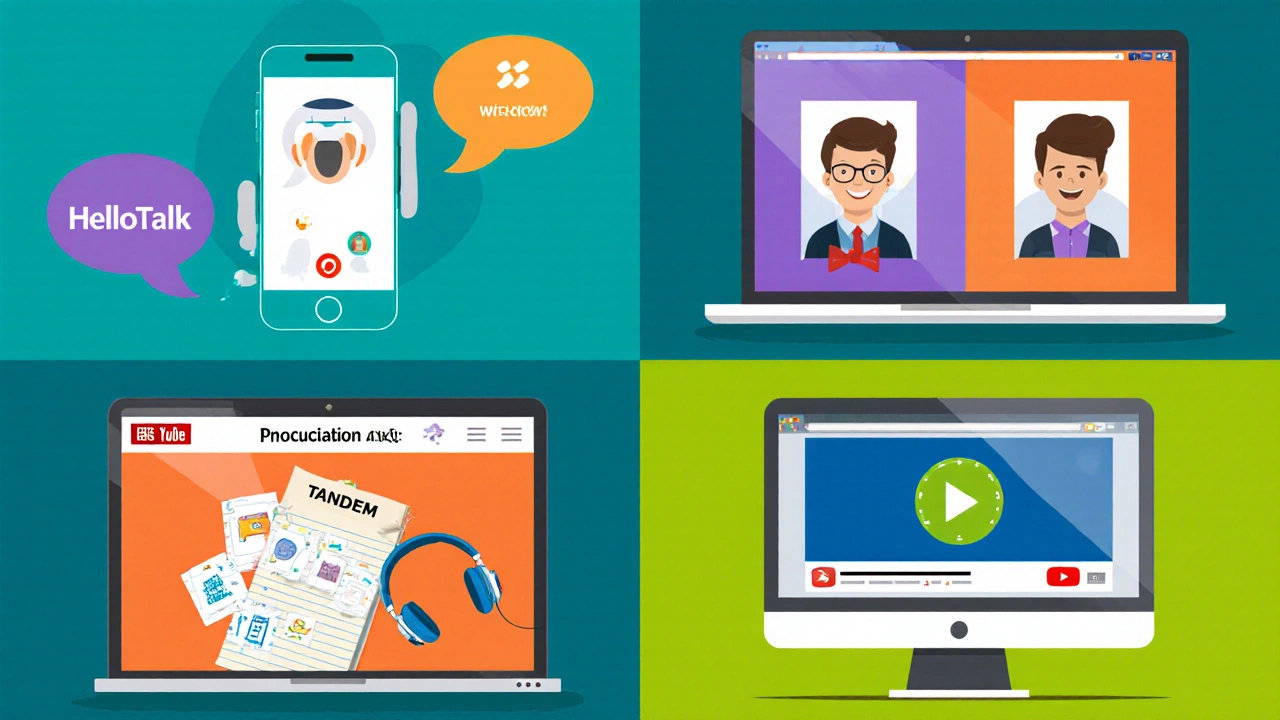Free English Speaking Practice Planner
Your Personalized Practice Plan
Consistency matters more than duration. Even 10 minutes of focused speaking practice daily can lead to significant improvement over time.
Quick Takeaways
- All the best speaking tools are free - you just need to know where to look.
- Mobile apps, YouTube channels, and community platforms cover every skill gap.
- Combine structured practice (apps) with real‑time conversation (language exchanges) for fastest progress.
- Set a daily 15‑minute speaking goal and track it; consistency beats intensity.
- Use free feedback loops - AI pronunciation checks, peer corrections, and recorded self‑reviews.
Why free resources can work
When it comes to English speaking is a skill that lets you communicate verbally in English, covering pronunciation, fluency, and confidence, you don’t have to drop hundreds of dollars on a private tutor. The 2025 digital landscape offers AI‑driven pronunciation tools, community‑run conversation clubs, and endless video content at zero cost. The key is treating free material the same way you would a paid course: set clear goals, schedule regular practice, and actively seek feedback.
Top free platforms for speaking practice
Below is a quick side‑by‑side look at the most popular free options. Each platform focuses on a different part of the speaking journey, so you can mix and match to suit your needs.
| Platform | Type | Speaking Focus | Interactivity | Best For |
|---|---|---|---|---|
| Duolingo is a free language‑learning app that includes speaking drills and AI‑powered pronunciation feedback | App | Pronunciation drills, short speaking prompts | Automated feedback, gamified lessons | Beginners who like bite‑size practice |
| HelloTalk is a social language‑exchange app that pairs you with native speakers for text, voice, and video chats | App | Real‑time conversation, correction tools | Peer‑to‑peer, instant messaging | Learners who want authentic dialogue early |
| Tandem is a free language‑exchange platform that matches you with tutors or peers for scheduled video calls | App/Web | Structured video sessions, lesson plans | Live video, optional professional tutors | Intermediate speakers seeking organized practice |
| BBC Learning English is a public‑service site offering audio clips, role‑plays, and pronunciation guides | Website | Listening‑to‑speaking drills, accent tips | Scripted exercises, downloadable PDFs | Students who prefer British English and academic style |
| YouTube is a video‑sharing platform with thousands of free English‑speaking channels | Video | Pronunciation tutorials, real‑life dialogues | Comment‑based feedback, community subtitles | Visual learners who like diverse accents |

How to use each platform effectively
- Duolingo
- Enable the "Practice Speaking" skill in settings.
- Complete the daily 5‑minute speaking challenge; repeat each phrase three times.
- After each lesson, tap the microphone icon to compare your pronunciation with the AI’s model.
- HelloTalk
- Create a profile stating you focus on speaking, not just texting.
- Search for native speakers who tag "English" and "voice chat".
- Start with a 2‑minute voice note; ask your partner to correct one sentence.
- Tandem
- Schedule at least one 30‑minute video call per week.
- Use the built‑in "Topic Cards" to keep conversation flowing.
- Record the call (with permission) and replay to spot recurring errors.
- BBC Learning English
- Pick a series like "Pronunciation Spot" and mimic each sentence aloud.
- Pause after each phrase, repeat, then check the transcript for missed sounds.
- Add the new words to a personal flashcard deck for spaced repetition.
- YouTube
- Subscribe to channels such as "English with Lucy" or "Rachel's English".
- Use the speed‑control feature to slow down fast native speech.
- Shadow the speaker: play a sentence, pause, repeat exactly, then compare.
Community‑driven ways to practice
Beyond apps, joining a community gives you real‑world pressure and instant feedback. Here are the most accessible free options.
- Language exchange meetups
Platforms like Meetup.com host local "English Conversation" groups in most major cities. Look for virtual meetups if you can’t attend in person. Bring a list of topics and aim to speak for at least 10 minutes before switching partners.
- Discord servers
Servers such as "English Learners Hub" offer voice channels for spontaneous chat, themed role‑play rooms, and scheduled "Speak‑Up" nights. Join the server, introduce yourself, and choose a voice channel that matches your level.
- Reddit communities
Subreddits like r/EnglishLearning and r/LearnEnglish host weekly "voice‑thread" challenges where members post short audio clips for peer review. Participate by uploading your own clip and giving feedback to at least two others.
- Facebook groups
Groups such as "Free English Speaking Practice" run weekly Zoom calls. The organizer usually shares a brief grammar tip, then breaks participants into breakout rooms for 5‑minute conversations.
Pro tips to boost your speaking without spending a dime
- Record yourself daily - use your phone’s voice memo app, then listen for gaps in fluency.
- Shadow native media - repeat lines from movies or podcasts in real time to train rhythm.
- Use spaced repetition for vocab - add new phrase chunks to Anki decks and review them during commute.
- Turn mistakes into mini‑lessons - note each correction you receive, then create a quick one‑sentence rule (e.g., "th" sound before "i").
- Pair speaking with an existing habit - describe what you’re doing while cooking, walking, or exercising.
Common pitfalls and how to avoid them
- Skipping feedback - practicing alone won’t surface errors. Schedule at least one peer or AI‑based review per week.
- Focusing only on grammar - speaking fluency improves more with repeated exposure than with isolated rule study.
- Using only one accent - expose yourself to American, British, and Australian speakers to stay adaptable.
- Neglecting pronunciation basics - spend 5 minutes on mouth‑position drills before every speaking session.
- Ignoring confidence - treat every mistake as data, not failure. Celebrate small wins (e.g., a clear “r” sound).

Frequently Asked Questions
Are there truly no hidden costs in these free platforms?
All the tools listed offer core speaking features at zero price. Some, like HelloTalk, have optional premium upgrades for ad‑free use or extra translation credits, but you can fully achieve fluency goals without ever paying.
How much time should I spend speaking each day?
Consistency beats marathon sessions. Aim for 15‑20 minutes of active speaking daily. Split it into a 5‑minute warm‑up (Duolingo), a 5‑minute conversation (HelloTalk), and a 5‑minute self‑review (recorded playback).
Can I improve my accent for free?
Yes. Use BBC Learning English’s accent‑specific series, shadow YouTube videos, and record yourself against the native audio. The AI in Duolingo also flags mispronounced sounds, giving instant pointers.
What if I don’t have a stable internet connection?
Download lessons offline from Duolingo or BBC Learning English when you have Wi‑Fi, then practice speaking offline using your phone’s voice recorder.
How do I stay motivated without paying for a class?
Set micro‑goals (e.g., "introduce myself without filler"). Celebrate each goal on a public forum like Reddit, or reward yourself with a favorite snack after a week of streaks.
